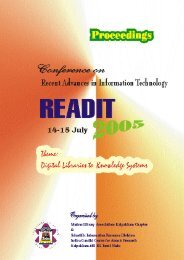READIT-2007 - Indira Gandhi Centre for Atomic Research
READIT-2007 - Indira Gandhi Centre for Atomic Research
READIT-2007 - Indira Gandhi Centre for Atomic Research
Create successful ePaper yourself
Turn your PDF publications into a flip-book with our unique Google optimized e-Paper software.
knowledge (tacit, internal and external) in order to develop new knowledge. It also<br />
includes activities such as solving a public health problem, devising a public health<br />
promotion strategy, discovering a pattern, developing a public health programme or<br />
intervention or conducting, monitoring, and evaluation activities. On the other hand,<br />
knowledge destruction frequently paves the way <strong>for</strong> knowledge creation and<br />
innovation. However, it is difficult to destroy old knowledge and replace it with the<br />
implementation of new knowledge (<strong>for</strong> example, replacing old clinical guidelines<br />
with new).<br />
Knowledge Integration:<br />
Knowledge integration is the capacity to trans<strong>for</strong>m a public health<br />
organization’s knowledge resources (tacit, explicit, individual, organizational,<br />
internal, external) into actionable knowledge by taking into account the organization’s<br />
strengths, weaknesses and opportunities as well as threats to the organization.<br />
Over the time, public health organizations learn to integrate the accumulated<br />
internal knowledge with knowledge acquired from other organizations or other<br />
external sources. Organizations integrate the knowledge accumulated over time,<br />
developing and delivering programmes, interventions and services using knowledge<br />
from external sources. However, integrating of raw knowledge into actionable<br />
knowledge is necessary but not sufficient to solve the public health problems;<br />
knowledge must also be shared and transferred. Knowledge sharing is more<br />
demanding than knowledge reporting. Reporting involves disseminating in<strong>for</strong>mation<br />
through codified <strong>for</strong>mats to target groups within a public health organization. By<br />
contrast, sharing implies person-to-person interactions during which one individual<br />
convert his or her (individual and often tacit) knowledge into a <strong>for</strong>m that can be<br />
understood by other members in the organization. Knowledge sharing provides the<br />
mechanism to trans<strong>for</strong>m individual knowledge into organizational knowledge that can<br />
be redeployed to create value and solve problems at the organizational level.<br />
Knowledge sharing is a social process that may lead to the emergence of communities<br />
of practice. In public heath, such communities exist at the local, regional, national and<br />
international levels. We can say knowledge transfer complements knowledge sharing.<br />
While knowledge sharing is associated with an exchange of knowledge between<br />
individuals and knowledge exchange is associated with exchange knowledge between<br />
organizations or departments or divisions within the organizations. Knowledge that<br />
has been shared or transferred provides a template or guideline <strong>for</strong> decisions and<br />
actions. Knowledge replication is the capacity to identify the attributes of the<br />
knowledge that are replicable, how these attributes can be recreated and the<br />
characteristics of the contexts in which they can be replicated. But it is found that<br />
there are significant differences between the attributes of the knowledge and the<br />
contexts of the action and decisions described in the templates and guidelines, and a<br />
real public health context. So, knowledge replication must be guided by the attributes<br />
of the local context of actions and decisions, especially with respect to public health.<br />
The capacity to replicate knowledge improves the efficacy and efficiency of public<br />
health programmes and interventions. However, many legal mechanisms of<br />
knowledge protection like patent, copyright, trademarks etc. restrict use of knowledge<br />
replication. To what extent knowledge replication has been able to give desired results<br />
and outputs, it should be assessed by knowledge per<strong>for</strong>mance. Assessments are based<br />
on perspectives like a) Value <strong>for</strong> money- investments in the creation, sharing and<br />
71

















